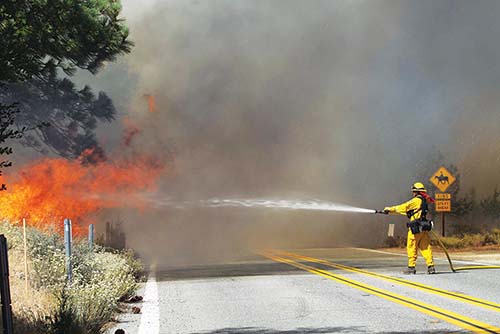
Photo by Jenny Kirchner
The California Department of Forestry and Fire Prevention (Cal Fire) has filed a lawsuit against Tarek M. Al-Shawaf, James Nowlin and Donna Nowlin for the costs of fighting the Mountain Fire. Hill residents Lon and Susan Paul, Martin Prevosto, Alisia Fisher, Doug McKellar and MTS&L Inc. aka McKellar Tree Service and Landscaping Inc. have also filed a separate lawsuit for damages they sustained in the same blaze.
Cal Fire is represented in its suit by California Attorney General Kamala D. Harris, through her deputies Michael T. Zarro and Ross H. Hirsch. The Hill residents are represented in their suit by the Law Offices of Shawn E. Caine, A.P.C. in Del Mar, through attorneys Shawn E. Caine and Christopher C. Sieglock.
Both lawsuits allege that the fire originated on real property in Mountain Center owned, operated and maintained by Al-Shawaf. Both allege that the Nowlins, as his agents and employees, were caretakers of Al-Shawaf’s property and are jointly liable with him. Cal Fire’s suit specifically alleges that the Nowlins jointly controlled the electrical equipment and lines used to deliver electricity to the Shawaf property.
Cal Fire’s complaint in California Department of Forestry and Fire Protection v. Shawaf, filed on July 13, two days before the two-year anniversary of the Mountain Fire, is pleaded in a single cause of action labeled “Fire Suppression Cost Recovery” pursuant to Health and Safety Code sections 13009 and 13009.1. This cause of action contains two subparts for violations of law and negligence. They allege that the defendants violated California Fire Code section 605.1 and 605.6 by using electrical equipment that was modified or damaged, including open junction boxes, so as to constitute an electrical shock or fire hazard. Cal Fire alleges that “[t]he Mountain fire began due to an electrical arc between electrically charged wires in an above-ground junction box on the Shawaf Property that caused hot material to escape the junction box and ignite the surrounding vegetation.”
Cal Fire further alleges that the junction box and other equipment on the Al-Shawaf property were “not installed, maintained, inspected and/or repaired in compliance with the California Fire Code.” The negligence part of Cal Fire’s cause of action alleges that the defendants failed “to inspect or monitor the Shawaf Property diligently, failing to repair the non-compliant and/or visibly damaged above-ground electrical junction box, and allowing electricity to be conducted through the Property’s electrical systems without proper precautions or notifications to foreseeable users of the Property.”
Cal Fire is suing for the costs of “fire suppression, investigation, report making, administrative, accounting, and collection costs” in an amount to be determined at trial, well in excess of the court’s jurisdiction minimum of $25,000.
The Hill residents’ complaint, Paul v. Al-Shawaf, filed on July 15, the two-year anniversary of the Mountain Fire, is pleaded in three causes of action: negligence, trespass and nuisance. The negligence cause of action alleges that the defendants’ actions and omissions created a dangerous condition of their property “in and around an area that was susceptible to wildfire” and that their conduct caused the fire, resulting in damages. The trespass cause of action alleges that they allowed a fire to ignite on their property and spread out of control into the plaintiffs’ property causing their damages. Their nuisance cause of action alleges that the defendants’ conduct “interfered with the free use and enjoyment” of the plaintiffs’ property, invading the plaintiffs’ right to use their property as set forth in California Civil Code section 3479.
Each cause of action states the Hill resident plaintiffs’ damages as in excess of $2 million. Both complaints maintain the routine practice of suing several unnamed defendants as Does, which allows any further-discovered defendants to be added later.
The next step in both lawsuits will be to serve the defendants with the complaints in both suits. Once service is effected, each defendant will have 30 days to file an answer to each complaint. Because Cal Fire is a public entity, the defendants’ answers to its complaint must be verified, in other words, signed under oath under penalty of perjury.
As usual, the Town Crier will report on further developments.
[This story has been amended to correct a code section number and the dates of filing of the two complaints mentioned herein.]
Jack Clark may be reached at [email protected].











Wow. Very well written and informative article. Thank you town crier.
[…] More on the story. […]
You fail to mention he has fled the country to escape prosicution.